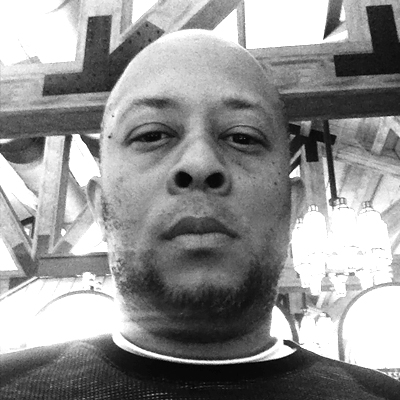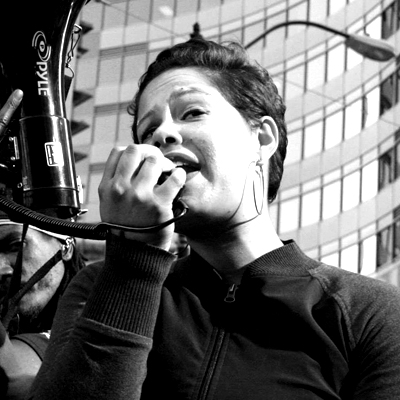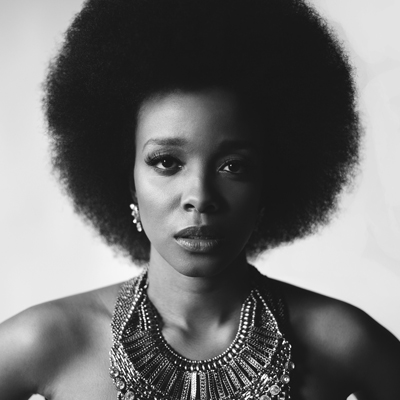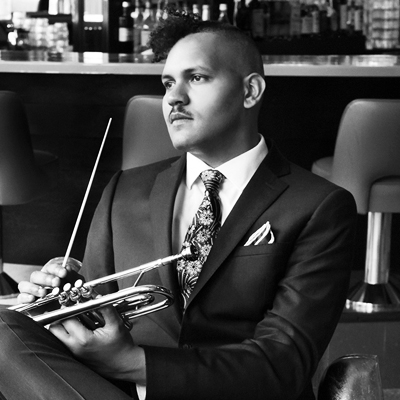Macklemore & Ryan Lewis - White Privilege II
This song is the outcome of an ongoing dialogue with musicians, activists, and teachers within our community in Seattle and beyond. Their work and engagement was essential to the creative process.

Evan Flory-Barnes
Bassist, composer, arranger, orchestrator, philosopher, Facebook rabble-rouser, and writer
I am passionate about creating work and moments that connect people to themselves and one another. I feel that the beauty we experience through a piece of music is our own beauty reflected. Within that beauty is joy, love, inspiration and creative possibility in all of one's endeavors.
I believe that art, at its root, is about creating connection and the confrontation of what hinders or obstructs connection. I am driven as an artist to celebrate people, creating experiences where people can find magic within the mundane. When a diverse range of people experience a piece of music or art together, this art has the potential to embody the antithesis of a racist power structure.
I have worked with M&RL on a number of projects over the years. And when asked to be a part of this deep and daring work, I was honored. Ben's willingness to address white privilege explicitly inspires me both as an artist and as a human being. I don't know if anyone in his position has spoken about it in interviews so clearly and candidly. I truly believe that "White Privilege II" will create something unprecedented in the discussion of race and racism in the American context, addressing long festered wounds in the psyche of our nation.
I feel this song can drastically change the landscape of the conversation. I hope that it can both provoke and soften people into deeper and much more present discussion. I also hope that it will challenge other "white" artists to engage the questions deeply. Most of all, I hope that folks listen to each other. Share humanizing experiences. Understand both the fallacy and real effects of "whiteness". I want to move matters to the heart. I want to move it past social media alone. The way out is through.

Hollis Wong-Wear
Poet, songwriter, community advocate, and vocalist in The Flavr Blue
I come from a spoken word background, raised by the community of Youth Speaks, where art and social change are extensions of each other, and where the power of collective voice is visceral. My involvement in Seattle’s hip-hop scene was born from recognizing the impact, vision, and potential for social change that the artists in our city embodied. I was first introduced to Ben’s work by listening to “White Privilege” in 2005 – myself just a college freshman – and appreciating its self-awareness as I personally formed my identity politics and social justice lens through my art practice and community. Now, after seven years of collaborating with Ryan and Ben in a number of capacities that have stretched and strengthened my artistic self, this moment is both full-circle and a point of departure in my work as an writer, artist and advocate.
This process was a deep one: over a year, we engaged in hundreds of hours of conversation, composition, revision and experiment. We pushed through it even when it was uncomfortable, exhausting, or evoked self-doubt. I believe this piece models one way to navigate through this work, and is certainly a document of our discourse.
As a mixed-race Asian-American writer and musician, this process was both an opportunity for me to take leadership within dialogue and collaboration, and also a chance for me to reflect deeply on my place within the movement for racial and social equity. The struggle for Asian-American rights and representation in this country was and continues to be significantly informed by the black liberation movement. Black forms of expression, such as hip-hop, have been models for Asian-Americans to discover our own agency and voice, and fight against our invisibility.
We are also at a crucial moment where it’s very important for Asian-Americans to identify and defy the pervasive anti-blackness that is frequently embedded in our families and communities. The famous “model minority” social construct is a consequence of anti-blackness. These mechanisms, and our willingness to accept or feel congratulated within them, fractions our potential to mobilize and create collective social progress.
As a non-black person of color, I need to hold the nuance of having the lived reality of being racialized and marginalized in white supremacy, but also recognizing the distinct differences in how my identity is privileged. I wish not to presume solidarity, or pretend that there is a blanket POC experience that exempts me from critically examining my role in white supremacy.
Working with Jamila was a profound joy: her thoughtfulness and creativity made this song immeasurably stronger. I am excited to continue work in my career focused on how women of color gather to center our experiences and have sustained support to create innovative work that holds focus. I am such a product of a vibrant sisterhood of artists, makers and boss ladies—all of whom deserve to be known, heard, and celebrated. I am influenced and inspired by the leadership of Alicia, Opal and Patrisse of Black Lives Matter. Their work and visibility goes far in recognizing that genuine social movements are radically inclusive, and that dismantling patriarchy is essential to our collective liberation.
I hope that this song encourages white people to talk about race in a way that is not defensive or personal but instead honest, critical and constructive. I hope that articulating the reality of white supremacy is normalized and that we recognize how numb we have become to the perils of state violence and institutionalized oppression. The questions I hope that each listener, in particular white listeners, will leave with are the questions that guided this collaboration:
Where is your heart? What are you willing to risk for true social equity?
Recommended reading: This Bridge Called My Back: Writings by Radical Women of Color, edited by Cherrie Moraga and Gloria Anzaldua

Georgia Roberts
Seattle-based educator, reader, writer, Rakim fan
I think first and foremost, white people have to commit themselves to learning how they became “white,” to read books and study history. Racial classification is not a natural phenomenon; it’s a historical one. The idea of “whiteness” is rooted in settler colonialism and slavery. That’s not an opinion or a political position. It’s a fact.
I believe people who have been categorized and socialized as white have an important role to play in undoing structural racism. We know how it works, intimately, but often lack the critical distance to recognize and confront it in ourselves, in our families and in our workplaces.
The song, though very much from Ben’s particular point of view, reflects many of the conversations we’ve had over the past year about these issues. While it’s important to individually acknowledge that one has benefitted from white privilege, I believe we only pose a challenge to power structures when we find ways to act collectively. The song sets a tone and intention to not only challenge whiteness but to also work and study collaboratively, to be held accountable.
Recommended reading: The Autobiography of Malcom X, as told to Alex Haley

Martin Friedman
Anti-racist white organizer with the People's Institute for Survival and Beyond, Seattle European Dissent and the Black Prisoners Caucus
Meeting Ben and the Macklemore & Ryan Lewis team, discussing structural racism with them and hearing “White Privilege ll” reminded me of my own journey. Growing up in Cleveland, Ohio in the 1970’s, I thought racism was one person hating another person based on their race. I thought “racists” were people who made bigoted comments or acted on discriminatory beliefs. While attending the People's Institute Undoing Racism training I was taught that racism is embedded in large systems and institutions and that no matter what I may believe in my heart or mind, I walk through the world as a white person and am given privileges because of the color of my skin.
This profound shift in my awareness and understanding propelled me to dedicate the last twenty years of my life to anti-racist organizing and education. I want racism to end so I will no longer be complicit, and because I believe there is more than enough dignity and resources to go around.
I recognize that race, paradoxically, is both a false construct and also a force with a very real impact on all of us. One’s racial designation impacts every aspect of one's life: projected health, life expectancy, economic opportunity, likelihood of incarceration, and the ability to accumulate wealth. For white people, our relative safety and comfort is only possible through the systemic oppression of black people and people of color.
We have allowed racism to divide and separate us. I think about the tragedy in South Carolina where Dylan Roof killed nine black people as they worshipped in their church. His blatantly racist beliefs motivated him to kill in cold blood, yet I also recognize that Roof had bought into a common ideology in this country: blaming individuals for our problems, not systems and institutions. Racism does not start in the hearts of bad people; racism is taught and affirmed throughout our lives.
The messages we receive as white people are often absorbed unconsciously. We have bought into a narrative that says we have what we have simply through hard work, yet institutional and systemic racism have helped us greatly. These two opposing ideas cause us to be defensive and confused. Our confusion leads to complacency, which leads to inaction.
“White Privilege II” struck me most in how Ben captures the journey of so many anti-racist white folks by focusing on the questions in his head, instead of preaching answers or holding himself up as a truth-sayer. I appreciate his transparency around the complexity of whiteness within the song.
Doing nothing changes nothing. Imagine if we all did something. It starts with education, and recognizing where in your life you’re able to apply your privilege. It continues with deep self-examination of what we have internalized in this white supremacist society and how denial and confusion helps keep racism in place. Talk to your family and friends about white privilege. You can also seek out groups in your area like Showing up for Racial Justice and European Dissent to make sure that your work is done in an accountable way. We have lost sight of the cost of our power and privilege and have needed to be reminded that Black Lives Matter – for the sake of our own humanity.
Recommended reading: A People’s History of the United States, by Howard Zinn

Dustin Washington
Core-trainer with The Peoples Institute for Survival and Beyond and director of the Community Justice program with The American Friends Service Committee
I first met Ben one year ago when he attended a community based Undoing Racism session with members of Youth Undoing Institutional Racism in Seattle, WA. Throughout this session we wrestled with dynamics of systemic poverty, the historical construction of race and racism in the United States, contemporary manifestations of structural and systemic racism, internalized racial oppression and anti-racist organizing.
It would be through the relationship built during that workshop that I was asked by Ben this fall to weigh in on a new song he was working on around white supremacy and his role as a white artist in hip-hop. I found the song to be a sober and sincere reflection of Ben’s commitment to wrestle with the complexities and contradictions of being a white artist in a Black cultural art form born out of resistance to racism. I also respect Ben’s willingness to take a proactive stand as an artist around the issue of white supremacy and its deadly impact on the black community and other peoples of color. The song “White Privilege 2” is a direct call to action and critical engagement especially to listeners and fans who are white. Strikingly, I have never heard a white artist of any genre speak so directly to America’s inability to face up to and eventually end the plague of white supremacy. We are long past due for all white people to show their commitment to anti-racist transformation. Especially those who have the ear of so many, as Macklemore currently has.
However, just listening to a song is not enough. I would encourage all of those who have come to be called white to begin to explore themselves, their family’s history and the real life implications of being racially and politically classified as white in a society based on an ideology of white supremacy.
How can you get authentically involved in the movement to eradicate racism from our society? Attend an Undoing Racism training or Freedom School in your city, financially support the Black Lives Matter movement in your community or research and join a collective of white people seeking to organize against racism in your region. Whatever you do, you must do something. Inaction makes you complicit. Silence is Betrayal.
Lastly, I would urge all white people who seek to step into the movement for racial justice to wrestle with a critical existential question: how does your liberation come from dismantling structural racism? It will be from this place of clarity that white people will be truly willing to take risks and make sacrifice to end racism. You can’t be my ally but you can be my partner in the struggle to create a racially equitable society.
Recommended reading: Ella Baker and the Black Freedom Movement: A Radical Democratic Vision, by Barbara Ramsey

Nikkita Oliver
Seattle-based anti-racist organizer, activist, creative, performance poet, musician, teaching artist, and lawyer
In the winter of 2014, after the non-indictment of Darren Wilson, Hollis Wong-Wear hit me up saying, “Macklemore (Ben) would like to meet with you (and other BLM activists/organizers) about the Black Lives Matter movement in Seattle.” My initial reaction was, “Why?” Like many black members of the hip-hop community I have a rather critical analysis of Macklemore and white supremacy in hip-hop—an art form and culture birthed out of the struggles and ingenuity of black people. Yet, I knew if I truly value the principle “each one teach one,” then I would sit down and have, in the least, a dialogue with Ben.
Hollis, Ben and I talked for nearly three hours about BLM, Seattle, hip-hop, intersectionality, and ending white supremacy. It was clear to me from that conversation that Ben’s desire to be a part of the movement in an accountable manner was genuine.
A month later Ben asked if he could spit some bars for me. Sitting in his Cadillac on Broadway I listened to the first iteration of the song. For nearly two hours we talked; thinking through different elements of the writing, the movement, and what it looks like to stand in accountable solidarity with BLM as a wealthy white cis-gender male with a wide music platform.
In the process of creating the song Ben connected with a myriad of other anti-racist organizers, BLM activists and artists in Seattle and other cities. For nearly a year we met off and on—Ben playing me the latest iteration and me critiquing and giving feedback. The goal remaining solidarity and accountability—even if that meant the song was never released.
So, here we are now—the song is completed and released. Why work on a track about white supremacy and Black Lives Matter with Macklemore?
Firstly, in the process of our dialogues, I came to see Ben the person beyond Macklemore the artist. As a black member of hip-hop culture, I had (and in some ways still have) my reservations. Yet as I got to know Ben and his team it was his/their humanity that convinced, and continues to encourage, me to be a part of this process. Together we are working through what it means to have accountable solidarity in community and in hip-hop.
Secondly, as much as it pains my humanity to admit, most white people will not listen to me when I speak about my experience and white supremacy. Macklemore has a platform in the ear buds of white youth all over the United States. They likely will not hear me, but they will listen to Ben’s music. I hope that this song moves white allies to have conversations with other white people about white supremacy, why black lives matter and why it is important to hear and follow the voices of those most marginalized and oppressed by the system.
Ultimately, this song is birthed out of black struggle to break free from oppression and white supremacy. It is not a song to be celebrated. Rather, it is opportunity for an important and necessary dialogue. This song is by no means the end of anything. It is merely a piece of the conversation. I hope it gets people talking about the right things in a creative way.
Recommended reading:
The Fire Next Time, by James Baldwin
Creative Justice
How to Love this Queer Body of Color: An Unapology

Jamila Woods
Chicago-based vocalist and award-winning poet; associate artistic director of Young Chicago Authors
I participated in this record because I believe strongly in the mission behind it. I was honestly wary at first because of what it sounds like: “Macklemore doing a song about Black Lives Matter...” When you hear that for the first time, it’s only natural to give it a side eye.
One of the most challenging parts of the creative process was knowing that the song was being created with a white audience in mind. I always approach writing from a place of love, not a passive love but an active love – an I’m-gonna-tell-you-when-you’re-messing-up-because-I-love-you kinda love. That’s how James Baldwin talks about his relationship to America. That’s how I feel about my relationship to my white audience.
I think white people who want to take positive action should start to asset map. Rather than being frozen in guilt and thinking about what you “can’t do” or how daunting actions may seem, think of all the skills you have and all the communities and spaces you have access to. How can you utilize your assets to create real impact for Black liberation?
The process of making this song is a microcosm of how I imagine white people aiding Black liberation struggles. You can’t just have a good intention and run with it. You have to listen to the needs of Black people in your community and in organizing spaces. This means doing your own research and building authentic relationships with Black people. It also means talking to other white people – your family, friends, and networks – about these issues. You have to court discomfort in order to improve yourself and our world. You may not always “get it right,” but it’s important to stay humble and stay learning.
My hope is that this song inspires people who were not formerly engaged in Black Lives Matter or Black liberation struggles to view themselves as agents of change. It is necessary for white consumers of hip-hop to understand it as a socio-political movement, and to embrace the opportunities and responsibilities that come along with engaging in hip-hop culture.
Recommended reading: The Fire Next Time, by James Baldwin

Ahamefule J. Oluo
Trumpet player, composer, writer, stand-up comic and theatrical director
I live in Seattle, play trumpet in the Stranger Genius Award-winning jazz group Industrial Revelation, and I write for various local and national publications. I was recently featured on This American Life and the musical I wrote, directed, and star in, NOW I'M FINE, just had its New York debut at the Public Theater in January of 2016.
Much of my work relates to race, class, gender, bodies, and the various inequalities that surround us. I am the father of two teenage girls and I would like to do what I can to make the world a little bit better for them.
When Ben and Ryan asked me to come in and talk about what they were working on, and as I began to understand the content, scope and gravity of the statement they were attempting to make, my first thought was, "What's the intention?" So, only minutes later, when they played for me the work-in-progress demo of the piece and I heard them asking themselves that same question, in plain English, out loud, on the track, I knew I wanted to work on this. I knew that they weren't taking the easy way out and I knew that they knew that this wouldn't go over smoothly with many of their fans and critics – that they would alienate some people on all sides of the racial divide. They were willingly risking a part of their career for the sake of this conversation. It is not a conversation that Macklemore and Ryan Lewis started, it's not one that they will finish, but it is a conversation that nearly all white artists have felt safe watching from the sidelines. Addressing cultural appropriation and white supremacy is a messy process, no one can do it perfectly, and it's definitely easier for white people to not do it at all, but it's necessary for the livelihood of black artists and the integrity of white ones. When I saw what Ben and Ryan were attempting, I wanted to help. I wanted to do what I could to get this message out in a way that was the most constructive but also the most musically interesting.
This song was not made for me. I hope that many kinds of people enjoy it, but this song was made for white people, and I hope that white people listen to it carefully. I hope that the next time their Facebook feeds fill up with reports of the next unarmed black person shot down in the street by those who are supposed to be our protectors, they remember some of the words of this song. I hope they think before they speak and remember the role that they play in the injustice and destruction that weigh us down. Then, maybe, we will have at least one more pair of hands to do just a little more lifting. That is my intention.
As a company (Macklemore & Ryan Lewis LLC), we are committed to a long-term investment of our time, resources, finances and creative capacities towards supporting black-led organizing and anti-racist education & discourse.
We are engaging with four initial organizations and collectives whose work inspires and informs us: Black Lives Matter, People's Institute for Survival and Beyond, Youth Undoing Institutional Racism & Freedom School (a project of AFSC and The People's Institute), and Black Youth Project 100.
In dialogue with our community partners and advisers, we will continue to find ways in which we can leverage our platform and network towards strengthening the work of organizers and initiatives framed by genuine racial and social equity. We recognize that there are no easy answers, any one piece of legislation, or quick fix to undo institutional racism in our country. We wish to support direct organizing and be led by the expertise and experience of those on the front lines as we proceed.
Musicians
- Tyler "XP" Andrews
- Darian Asplund
- DeShe' Brooks
- Gena Brooks
- Tanisha Brooks
- Liza Curtiss
- Evan Flory-Barnes
- Ben Haggerty
- Josephine Howell
- Josh "Budo" Karp
- Russell Leonce
- D'Vonne Lewis
- Ryan Lewis
- Ahamefule J. Oluo
- Josh Rawlings
- Malaelupe Samifua
- Maelu Strange
- Symbolyc One and Grey
- Sam Townsend
- Hollis Wong-Wear
- Jamila Woods
Community
- Ron Chisom
- Jonathan Cunningham
- Tricia Davis
- Josh Dick
- Martin Friedman
- Jackie Ganger
- Amir Islam
- Jason Koenig
- Tim Lennon
- Aaron Walker-Loud
- Nikkita Oliver
- James Peterson
- Kevin Powell
- Zach Quillen
- Peter Richards
- Dr. Kimberley Richards
- Georgia Roberts
- Cameron Sage
- Ben Secord
- Sharod Smith
- Gabriel Teodros
- Dustin Washington